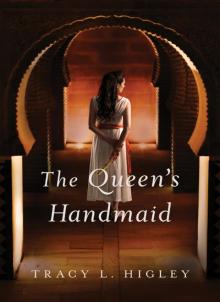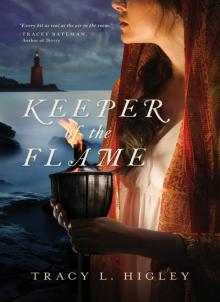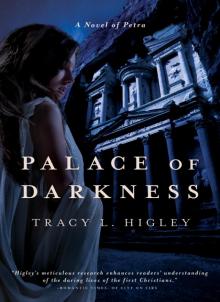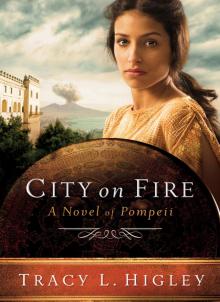- Home
- Tracy L. Higley
City on Fire
City on Fire Read online
ACCLAIM FOR TRACY L. HIGLEY
City on Fire, previously released as Pompeii
“Higley’s Pompeii ignites with riveting and compelling characters. No one unleashes the secrets of history with a masterful hand the way Higley does! Authentic and powerful, [City on Fire] is a fiery tale of a city lost to the power of Vesuvius. I simply could not read fast enough!”
—RONIE KENDIG, AUTHOR OF
THE DISCARDED HEROES SERIES
“[City on Fire] is a richly detailed story of powerful redemption and raw courage. Higley takes readers right to the foot of the legendary volcano, Vesuvius, and spins her tale under the shadow of certain disaster.”
—GINGER GARRETT, AUTHOR
OF WOLVES AMONG US
“Higley brings Pompeii to life again in this exhilarating tale of love and adventure. The story was so enthralling to me—I want to read it again!”
—ELIZABETH GODDARD, AUTHOR
OF THE CAMERA NEVER LIES
So Shines the Night
“Higley proves once again that she has a great talent for historical fiction. It is easy to get lost in the ancient world with Daria during her adventures. The story is so well detailed and the struggles between different faiths and cultures is exceptionally illustrated. Daria characterizes all one would hope for in a strong, brave woman of faith.”
—ROMANTIC TIMES BOOK
REVIEWS, 4-STAR REVIEW
“I love Tracy Higley’s novels. Meticulously-researched, spell-bindingly written with luscious prose and compelling and complex characters, each one is a treasure. Higley knows her history, but more importantly, she knows just how to capture the struggles and questions of the human heart—yesterday and today.”
—TOSCA LEE, NEW YORK TIMES BEST-
SELLING AUTHOR OF HAVAH: THE STORY OF
EVE AND THE BOOKS OF MORTALS SERIES
Garden of Madness
“Readers will find much to enjoy here: fine writing, suspense, mystery, faith, love, and a new look at an old story.”
—PUBLISHERS WEEKLY
“The author’s insights into a woman’s inner strengths . . . will leave readers rejoicing.”
—ROMANTIC TIMES BOOK REVIEWS,
4½ STARS, TOP PICK!
“Mystical as the Seven Wonders, exotic as the Hanging Gardens. Higley has outdone herself with this exquisite story of intrigue, elegantly told and rich with all the flavors of ancient Babylon. Simply magnificent.”
—TOSCA LEE, NEW YORK TIMES BEST-SELLING
AUTHOR OF HAVAH: THE STORY OF EVE AND
THE BOOKS OF MORTALS SERIES
“Even more riveting than the historical background is the mystery that Higley creates as the backdrop to her exploration of the ancient world . . . Readers will not be satisfied until they have discovered the truth along with Tiamat.”
—DR. SHANNON ROGERS FLYNT,
ASSISTANT PROFESSOR, DEPARTMENT
OF CLASSICS, SAMFORD UNIVERSITY
“Each of Tracy Higley’s historical novels is more powerful than its predecessor, and Garden of Madness continues the trend. I was drawn into the ancient Babylonian world from the very first page and held spellbound until the last, savoring every moment of Tia’s journey from despair to redemption. Whether you’ve read Higley’s previous works, or are just discovering her amazing stories, you must not miss this one!”
—JANELLE CLARE SCHNEIDER,
AUTHOR AND SPIRITUAL DIRECTOR
Isle of Shadows, previously released as Shadow of Colossus
“One of the most beautifully written books I’ve ever encountered. The prose is amazing, the story is riveting, and the characters are complex. I was absolutely and completely satisfied with every aspect of this story, which is rare for me. I am now a HUGE Tracy Higley fan.”
—RONIE KENDIG, AUTHOR OF
THE DISCARDED HEROES SERIES
“Fast-paced adventure, fascinating characters and insights into the culture, politics and people of this ancient world make this book a unique and unmissable read.”
—REL MOLLET, RELZREVIEWZ.COM
“This is such a unique historical novel that it really sets itself apart from all others. Higley’s portrait of day-to-day life in the ancient world drew me in and her strong heroine kept me reading.”
—JILL HART,
THESUSPENSEZONE.COM
“Blending suspense, romance, political intrigue, and a healthy dose of drama, Higley brings the struggles, class differences, and pagan culture of ancient Greece to vivid life . . . Strong characterization combined with rich historical detail have won this book a home on my shelves of keepers.”
—JENNIFER BOGART,
TITLETRAKK.COM
ALSO BY TRACY L. HIGLEY
Garden of Madness
Isle of Shadows
So Shines the Night
The Queen’s Handmaid (Available Spring 2014)
Pyramid of Secrets (Available as e-book only, November 2013)
© 2013 by Tracy Higley
All rights reserved. No portion of this book may be reproduced, stored in a retrieval system, or transmitted in any form or by any means—electronic, mechanical, photocopy, recording, scanning, or other—except for brief quotations in critical reviews or articles, without the prior written permission of the publisher.
Published in Nashville, Tennessee, by Thomas Nelson. Thomas Nelson is a registered trademark of Thomas Nelson, Inc.
Thomas Nelson, Inc., titles may be purchased in bulk for educational, business, fund-raising, or sales promotional use. For information, please e-mail [email protected].
Publisher’s Note: This novel is a work of fiction. Names, characters, places, and incidents are either products of the author’s imagination or used fictitiously. All characters are fictional, and any similarity to people living or dead is purely coincidental.
Library of Congress Cataloging-in-Publication Data
Higley, T. L.
City on fire / Tracy L. Higley.
pages cm
ISBN 978-1-4016-8752-6 (trade paper)
I. Title.
PS3608.I375C585 2013
813’.6--dc23
2013013009
Printed in the United States of America
13 14 15 16 17 18 RRD 6 5 4 3 2 1
To Mike and Pam Dittman
and
Pat and Nadine Pileggi
. . . who first taught me that girls could be warriors, too.
You have always encouraged me to find my
adventure and pursue it with passion.
For this I am grateful.
CONTENTS
WORD LIST
PROLOGUE
1
2
3
4
5
6
7
8
9
10
11
12
13
14
15
16
17
18
19
20
21
22
23
24
25
26
27
28
29
30
31
32
33
34
35
36
37
38
39
40
41
42
43
44
45
46
47
48
49
50
51
52
53
54
THE STORY BEHIND THE STORY . . . AND BEYOND
/>
READING GROUP GUIDE
ACKNOWLEDGMENTS
ABOUT THE AUTHOR
WORD LIST
aedile—city official, mainly responsible for public buildings and festivals
amphorae—a two-handled jar with a narrow neck used to carry wine or oil
apodyterium—changing room for the men in the bathhouses
aureus—gold coin valued at 25 silver denarii
bestiarii—fighters who faced beasts in the arena
calidarium—hot room of the bath complex, with a hot plunge bath
Capitolium—temple of the gods, with great arches on either side
contubernium—a unit of soldiers in the Roman army, composed of eight legionaries
cornu—a curved brass instrument used for communicating in battle
Decanus—Roman military title, leader of the contubernium
denarii—Roman silver coin
duovir—one of two joint city magistrates, mainly responsible for administration of justice
editores—politician sponsoring public games, to curry public favor
Eumachia—building in Pompeii named for priestess of Venus, used by the fullers
frigidarium—cold room of the bath complex, with a cold plunge bath
garum—ancient Greek and Roman condiment, a fermented fish sauce
gradi—unit of distance equal to approximately 2.5 feet
HaShem—literally, “the name,” the Jewish word used for God
impluvium—sunken part of an atrium to catch the rainwater coming through the open roof
insulae—tenement-type apartment buildings in ancient Roman cities
Junius—the month of June
Kykeon—ancient Greek alcohol that brought on frenzied hallucinations
lancea—a Roman short javelin
lanista—trainer of gladiators
locarii—ushers who checked on visitors’ seating in the Roman games
lupanaria—brothel named for the “lupe”—the she-wolf, whose call the women mimicked
Macellum—main market of the city
Murmillo/Murmillones—gladiator with high-crested and broad-rimmed helmet that resembled a fish
ordo/ordo decurionum—city council
palaestra—the city’s main field for athletic training and fitness
palus—poles buried in the ground used for gladiator training
parados—the offstage corridor of the theater
pater familias—literally “father of the family,” head of the household
pilum—Roman long javelin
praenomen—first name, given by parents, to a Roman child
pugio—short sword
quadriporticus—four-sided courtyard surrounded by columned walkways
quaestor—city official, mainly responsible for financial matters
Retiarius/Retiarii—gladiator who used a casting net and trident as weapons
rudis—wooden training sword, also used as a token given to a freed gladiator
scaenae frons—two-story façade behind the stage
Secutor—gladiator who fought heavily armed, including a helmet
sestertius/sestertii—brass coin
stola—woman’s garment, comparable to the man’s toga
suggestum—platform where orators could make their appeals
tabernae—single-room shop in market, with wide doorway and barrel-vaulted ceiling
tablinum—room on one side of the atrium, used as an office
tepidarium—warm room of the bath complex
thermopolium/thermopolia—ancient Rome’s “fast food restaurant”—masonry counters with sunken jars holding food
tholos—a circular building with various uses
triclinium—main dining area of a home
Vulcanalia—festival dedicated to Vulcan, god of fire
“. . . a peak of Hell, rising out of paradise.”
—JOHANN WOLFGANG VON
GOETHE, ON VESUVIUS
From its lofty place above the sparkling crescent Bay of Napoli, Vesuvius loomed over the surrounding towns, pressure building beneath its grassy slopes.
The hot springs that bubbled up from deep within brought pleasure-seekers from the north to bathe in secluded groves, and the mountain boasted lemon trees and long waving grasses where wildlife grazed the foothills. The purple, cloud-kissed peak shone always in the sunlight.
But under it all, where the eyes of no patrician or plebeian saw, it churned with an angry force waiting to be unleashed.
It had been quiet these many years. Too many years for counting, even. Controlled, subdued, silent as generation after generation lived and farmed and reveled in its long shadows.
But not for long. No, not for long.
Though the people who lived beneath it believed they controlled their own destiny, they would soon learn that their fate was not in their own hands.
PROLOGUE
Jerusalem
August 9, AD 70
Ariella shoved through the clogged street, defying the mob of frantic citizens. Men, women, and children crowded the alleys, senseless in their panic to flee the city. They carried all they could, packed into pouches slung across their chests and clutched in sweaty hands. Soldiers ran with them, as though they had all joined a macabre stadium footrace, with participants who clubbed and slashed at each other to get ahead. Beside her, one of the district’s tax collectors tripped and fumbled a latched wooden box. It cracked against the cobbled street and spilled its meager hoard of gold. The tax collector was dead before he hit the ground, and the Roman soldier pulled his sword from the man’s gut only to scramble for the coins.
Ariella turned her head from the gore but felt little pity for the tax man, cheated of life by the Romans for whom he had betrayed his people. Still, concern flickered in her chest at the sudden violence in the street.
Something had happened.
The city had been under siege for months. Three days ago her mother announced that the sacrifices in the Temple had ceased. But today, today was something new. Perhaps three days of sins not atoned for had brought the wrath of the Holy One down on them all.
Ariella’s destination was neither Temple nor countryside, unlike those who ran in the streets with her. She returned to her home—if the dim tenement could be called such—from another useless excursion to secure food.
At sixteen and as the eldest child, it fell on her to search the famished city for a scrap of dried beef to feed her brother, perhaps a thimbleful of milk for the baby, crumbs for her father whose eyes had gone glassy and whose skin was now the color of the clay pots he once turned on the wheel.
But there was no food to be found. Titus, the emperor’s son, had arrived in the spring with his army of eighty thousand, and his siege wall served well its double function—the people were trapped and they were starving.
Not even such a wall could prevent news from seeping through its cracks, however. From Caesarea, word escaped of twenty thousand Jews slaughtered in a day. Fifty thousand killed in Alexandria. Ten thousand met the sword in Gamla. Such numbers were incomprehensible.
Here in Jerusalem, the bodies thrown outside the city were too numerous to count, piled high in rotting mounds, as though the city itself were defiled and would forever be unclean.
Yet we are not all dead. Ariella’s hands curled into tense fists as she rounded the last corner. She would cling to life as long as she had strength and, like her untiring mother, she would hold tight to that elusive thread for each member of her family.
She pushed against the rough wood of the door and slipped out of the rush of the street. The home’s tomb-like interior had the peculiar smell of starvation. In the corner, her baby sister whimpered as if in response to Ariella’s entrance. Micah met her at the door, his sunken eyes fixed on her and his lips slightly open, as though anticipating the food she might have brought. Or perhaps he simply lacked the strength to close his jaw. She shook her head and Micah turned away, hiding his disappoint
ment as all boys of eleven do when they are threatened by tears.
Her father did not speak from his mat on the floor. Ariella scooped the listless baby, Hannah, into her arms and gave her a finger to suck. Small consolation.
“Where is Mother?” She scanned the room, then looked to Micah. A low groan from her father set her heart pounding. “Where is she, Micah? Where has Mother gone?”
Micah sniffed and glanced at the door. “To the Temple. She has gone to the Temple.”
Ariella growled and pushed Hannah into her brother’s arms. “She is going to get herself killed, and then where will we be?”
She bent to her father’s side. The man had been strong once. Ariella could barely remember. She touched the cool skin of his arm. “I will bring her back, Father. I promise.” Her father’s eyes sought her own, searching for reassurance. The hunger seemed to have stolen his voice. How long until it took his mind?
She turned on Micah, grabbed his shoulder. “Do not let anyone inside. The streets—” She looked to the door. “The streets are full of madness.”
He nodded, still cradling Hannah.
She kissed the baby. “Take care of them, Micah.” And then she left to retrieve her mother, whose political fervor often outpaced her common sense.
The midsummer sun had dropped in the sky, an orange disc hazy and indistinct behind rising smoke. The city burned. She smelled it, sensed it, felt it somehow on her skin as she joined the flow toward the Temple—a heat of destruction that threatened to consume them all.
Her family enjoyed the privilege of living in the shadow of the Temple Mount. A privilege that today only put them closer to folly. She twisted through the crazed mob, darted around wagons and pushcarts laden with family treasures, swatted at those who shoved against her. Only halfway there, her heart struck against her chest and her breathing shallowed, the weakness of slow starvation.
She reached the steps to the south of the Temple platform and was swept upward with the masses. Why were so many running to the Temple? Why had her mother?
And then she heard it. A sound that was part shrieking anger, part mournful lament, a screaming funeral dirge for the city and its people. She reached the top of the steps, pushed through the Huldah Gate, dashed under the colonnade into the Court of the Gentiles, and drew up short. The crowd pressed against her back, flowed around her and surged onward, but Ariella could not move.

 The Queen's Handmaid
The Queen's Handmaid Keeper of the Flame
Keeper of the Flame Palace of Darkness
Palace of Darkness City on Fire
City on Fire